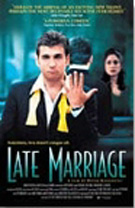Late Marriage (Hatuna Meuhet)
| Dover Koshashvili’s feature directorial debut, Late Marriage (Hatuna Meuhet), is a blistering (and often funny) critique of conservative family traditionalism intruding on the realm of romantic love. Taking place in Tel Aviv in a close-knit community of Jewish émigrés from Soviet Georgia, it tells the simple story of how a family controls its adult son’s life and how he is too weak to do anything about it. The son is 31-year-old Zaza (Lior Louie Ashkenazi), a doctoral student in philosophy who, to his parents’ great shame, has not married yet and seems to have no interest in doing so. In the film’s opening sequence, Zaza’s parents, Yasha (Moni Moshonov) and Lili (Lili Koshashvili), bring him over to another family’s house so that he may meet a prospective bride, 17-year-old Ilana (Aya Steinovits Laor), who is still in high school. The enormous age difference between the two doesn’t seem to matter to either set of parents, as Ilana is beautiful, unmarried, and still a virgin, and Zaza is handsome, intelligent, and has the potential to make a good living. It is a sequence of brilliantly sustained social comedy, as the family sits around awkwardly, discussing the potential groom and bride like objects to be traded—at one point, a parent asks if “the deal” has been “closed,” making the living room seem like a car lot. After this sequence, we find out why Zaza is so uninterested in marriage: He is in love with another woman, Judith (Ronit Elkabetz). However, he must keep his relationship with Judith from his family because he knows they will never accept her as his wife. Not only is she divorced and has a six-year-old daughter, Madona (Sapir Kugman), but she is (gasp!) three years older than Zaza. In other words, by his family’s estimation, she has absolutely nothing to offer but shame, regardless of how she and Zaza feel about each other. In the film’s second sequence, we see Zaza and Judith together during one night. It isn’t much time, but it gives us an intimate sense of their still-blossoming relationship. Much of this sequence is given over to a beautifully extended sex scene that is one of the most realistic and emotionally involving depictions of sexuality you’re likely to see anytime soon. With great bravery, the two actors allow themselves to be intimately human while making love, which means that it doesn’t look like anything in an Adrian Lyne movie. Rather, it’s awkward, funny, messy, but always physical and meaningful—sex as character revelation. This is exactly the kind of the scene that the MPAA would slap an NC-17 rating on in a heartbeat (which is likely why the film has been released unrated) because Koshashvili is too honest about the subject—he doesn’t try to dress it up with oblique camera angles, artistic lighting, and lush music, but rather allows it to play out honestly and with integrity. The feeling this scene leaves you with is not necessarily one of impassioned romance—the film is too down-to-earth for that—but rather of genuine affection and love between two characters who are both imperfect in their own ways, but may just be perfect for each other. The relationship between Zaza and Judith is destined for demise, though, not because of any cosmic fate, but because his family refuses to allow it to succeed. In the film’s most tense and heartbreaking sequence, Zaza’s entire family barges into Judith apartment and confronts the couple with disparagements that range from calling Judith a “whore,” to criticizing the fact that her oven is dirty, to one uncle who threatens her life. This is the film’s lynchpin moment, as it is Zaza’s chance to make his choice: Will he allow his family to continue to determine the course of his life, or does he make his stand? The fact is, he never really makes a choice because he eventually tries to have it both ways. Zaza is ultimately the film’s weakest character not because he gives in to his family’s unseemly pressure, but because he does so and then tries to go back on it in an embarrassingly half-hearted way. Judith, despite her low social position, emerges as the one character with true strength—she makes tough decisions and sticks with them out of a sense of self-dignity and a clear-eyed awareness of the way the world works. Yasha and Lili would also appear to be characters of great strength—or at least rock-solid conviction—but they ultimately pale in comparison to Judith because their sense of control in their own lives rests entirely on their ability to control others. Whether you agree with the practice of arranged marriages or not, it is nearly impossible to sympathize with their plight, although Koshashvili does make allowance for Lili’s humanity by having her talk to Judith and, to a limited extend, offer her respect. Late Marriage doesn’t pull any punches in either its depiction of its subject or its stance toward it. Koshashvili is hard on traditionalism and the dragging of ancient practices into the modern world. He shows how families can crush their young, all the time telling them that they’ll see someday why it had to be that way. Koshashvili’s point seems to be that right and wrong aren’t determined years down the road, but rather need to be assessed in the here and now. Copyright © 2002 James Kendrick |
Overall Rating: 


 (3.5)
(3.5)


